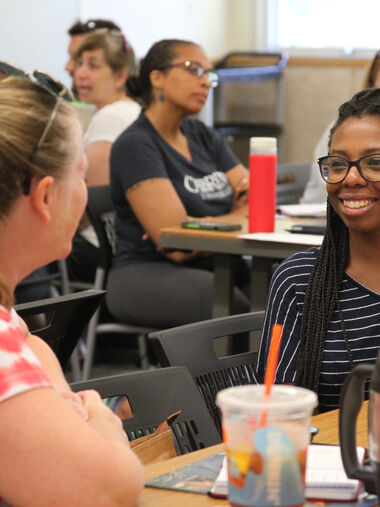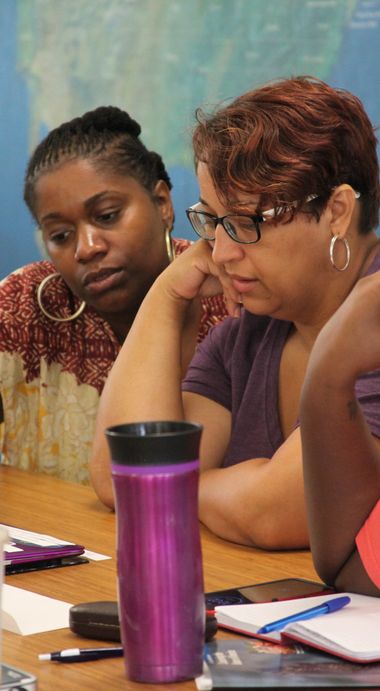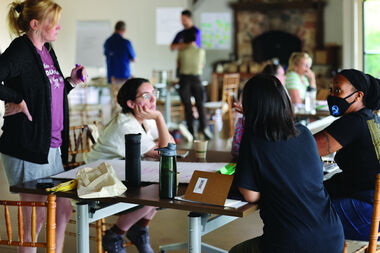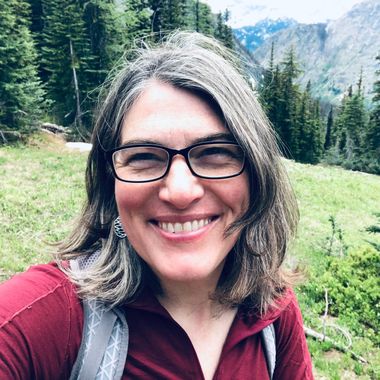
- Home
-
What We Do
- Programs
- Teacher Professional Development
Teacher Professional Development

About Riverbend's Teacher Professional Development Programs
The goal of Riverbend’s professional development programs is simple: to empower teachers to deliver nature-based STEM lessons to their students, both indoors and outside, using best-practice methods that are both inquiry-based and culturally responsive.
Teachers who participate in Riverbend's professional development programs gain skills in integrating nature and STEM topics across disciplines. They walk away with activities that they can implement in their classrooms. Moreover, they become equipped to serve as school and district leaders in STEELS/NGSS, as well as phenomenon-based and inquiry-based teaching.
Riverbend offers two types of professional development programming:
-
A year-long Community of Practice for K-8 teachers, focusing on pedagogy and nature topics, and building toward a student science investigation and earth action project (MWEE) in the spring (See Below)
-
Half-Day Programs On-Site at Schools
For more information, to schedule a PD program, or to create a customized program that supports your school curriculum goals, please reach out to Jill Shashaty, Riverbend’s Education Specialist: jshashaty@riverbendeec.org.

Award Winning Nature-Based STEM Community of Practice
BUILDING TOWARD STUDENT OUTDOOR SCIENCE INVESTIGATIONS AND AN EARTH ACTION PROJECT
Our yearlong Nature-Based STEM Community of Practice professional development program offers a unique opportunity for elementary school teachers to develop skills in STEELS aligned outdoor teaching, inquiry-based education, and phenomenon-based instruction.
What is the Nature-Based STEM Community of Practice?
This yearlong, teacher-centered program supports teachers in developing and implementing authentic inquiry-based and nature-based STEM learning experiences for students. This year's program will provide orientation to extensive practice implementing PA's new STEELS science standards as well as help teachers shape their instructional practices to support diversity, equity, and inclusion.
SUMMER: The program begins July 29-31 with a 3-day Summer Science Workshop devoted to inquiry-based science pedagogy, best practices for successful outdoor and nature-based teaching and teaching with the new STEELS standards.
FALL: During virtual monthly PDs in the fall, 4 workshops led by local environmental education partners boost teacher content knowledge in core environmental literacy subject areas such as watersheds, birds, native plants, and composting/waste.
WINTER/SPRING: During virtual monthly PDs in the winter and spring, teachers learn how to build and lead an outdoor science investigation and earth action project with their students. The framework we use for this experience – NOAA’s Meaningful Watersheds Education Experience (MWEE) – employs pedagogies such as inquiry-based learning and project-based learning and serves as a means to put the STEELS ELS standards into action.
SPRING: A Riverbend educator will visit your school to guide students in an indoor/outdoor lesson series, “Getting to Know our Schoolyard Ecosystems,” to introduce them to nature-based outdoor learning as well as the habitats and watershed on their school grounds.
SPRING CAPSTONE: Building on these lessons, teachers will put these new competencies into practice with their students using the MWEE framework to develop an outdoor science investigation utilizing STEELS phenomenon-based and 3D science learning, and create meaningful earth action projects that contribute to the local community and ecosystem.
Who is eligible?
Riverbend’s Community of Practice is FREE to teachers working in Title 1 schools thanks to generous grant support from Pennsylvania’s Department of Environmental Protection.
In past years, we’ve worked with teachers from schools around the region, including:
School District of Philadelphia: Lewis Elkin, John Moffet, FS Edmonds, Cook-Wissahickon, Juniata Park Academy, Fanny Jackson Coppin, James Rhoads, Keystone Charter, Stanton, Farrell, Anne Frank, Blaine, Cramp, Henry Houston, Overbrook Educational Center, SLA-MS, William Rowen, Carnell, and others.
Norristown Area School District: Musselman Learning Center, E. Norriton, Marshall Street, Paul V. Fly, Whitehall; Upper Darby School District: Aronimink, Highland Park, Walter Senkow, Beverly Hill Middle School; Colonial School District: Colonial Elementary; Hatboro Horsham School District: Hallowell.

Community of Practice Details
What does this opportunity include?
$500 stipend: Upon completion of the Summer Science Workshop and yearlong PD program, including the MWEE, teachers receive a $500 stipend.
$350 for MWEE materials/supplies: Teachers from Title I schools are eligible for funds for learning materials used in carrying out student science investigations and action projects.
Winter Field Trip to Riverbend: Bring your students to Riverbend for a winter field trip where your class can practice outdoor nature science investigation and study how our ecosystems and watersheds transform in winter. (Trip does not automatically include transportation costs, but funds are sometimes available for buses.)
School grounds consultation: An educator from Riverbend will visit the schools of all new participants for a brief campus walk-through to plan for outdoor lessons and identify ecosystem and watershed learning opportunities on your school grounds. All schools, regardless of how much or how little “green space” they contain, offer ample opportunities for nature-based outdoor learning.
Lessons at your school: A Riverbend educator will come out to your school for a series of four lessons with your students, entitled: “Getting to Know Our Schoolyard Ecosystems.” These lessons will focus on the ecosystems and watershed at your school and prepare students for creating a MWEE project. These lessons take place both outdoors and in the classroom.
Nature Journals: Each student will receive their own nature journal for use during the lesson series with Riverbend and during the MWEE that follows.
Support for your next steps – building your investigation and earth action project: Outdoor investigation and data collection focusing on a specific question and leading to an earth action project are essential components of the student experience in this project. Typically, teachers will bring students outside for investigation and data collection 1-3 times. Earth action projects can take place indoors or outside, depending on the type of project you and your students select. We are here to support you as you carry out your MWEE!
Belonging to a network of dedicated elementary science educators: Connecting with colleagues around the region for support, ideas, and inspiration is one of the best elements of our Nature-Based STEM Community of Practice!
Our 2025-26 cohort is full. Please check back in May 2025 for information about the 2026-27 cohort.
Please reach out to Jill Shashaty, Associate Director of Education, with any questions: jshashaty@riverbendeec.org
Financial and other support for the Nature-Based STEM Community of Practice has been provided by the Department of Environmental Protection’s 2025 Environmental Education Grants Program.
For more information please contact
